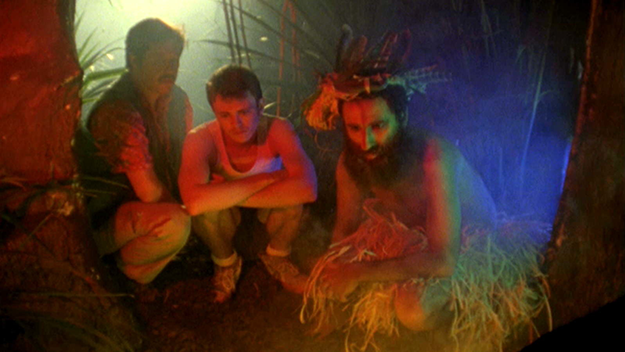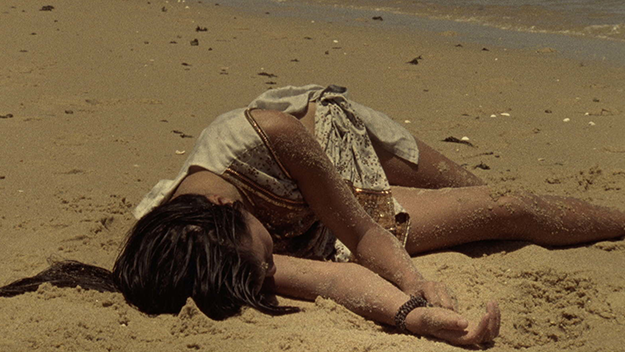Interview: Gabriel Abrantes
Raised in the U.S. and based in Portugal, Gabriel Abrantes joined contemporaries and occasional collaborators Alexander Carver, Benjamin Crotty, and Daniel Schmidt as the subjects of a weeklong retrospective last month at the Film Society of Lincoln Center. Since first experimenting with film at New York’s Cooper Union College, the 31-year-old Abrantes has rolled out a distinctive collection of globe-trotting short films. These queasy comedies are united by deceptively alluring Super-16 cinematography, a mixture of sophisticated and sophomoric humor, and a pile-up of culture-clash miscommunications.
Shortly after the filmmaker’s arrival in New York for the series, FILM COMMENT sat down with him in the vicinity of his Williamsburg Airbnb to figure out what, precisely, he’s on about.

A History of Mutual Respect
Until pretty recently, you were credited as co-director on a lot of the films but they seem to me to have some pretty clear through-lines in terms of the way that they look, in terms of the performance style, and also thematically. Now, the subtext of any kind of filmmaking, to a certain extent, is privilege, because access to filmmaking mechanisms is a privilege, and I think we can generalize pretty accurately in saying most people who have that access are not coming from hardscrabble, deprived backgrounds.
Of course.
But in the films that you’ve made, the subject of privilege is very, very much front and center.
I do come from a very privileged background by any perspective. And, at the same time, my parents—they work in public health—they started as Maoists, part of the Maoist party in Portugal during the revolution, very involved in political activism. My mom was the editor of the political section of the newspaper during the revolution, interviewing the captains of the revolutionary forces. And now 30 years down the line, they’re both driving Jaguars. That was what guided me, formed my skepticism towards activism and a political association that’s very direct and flag-waving. It’s clearly the Oedipal tendency toward communist revolutionaries that became… I mean, they’re great people, I don’t consider them evil-doers in any way. Maybe that lends some of the subtlety to my opinion of privilege in those films, and also criticism of characters that might not be so privileged.
One of the big things that I talked with [Benjamin] Crotty about, and also with [Daniel] Schmidt, is the blindness of privilege. That idea became a real guide to me. I think History of Mutual Respect [10] is really about that—these guys who are not even aware that they’re being racist, sexist. They’re just misogynist bros, with a sort of left-wing discourse that blends into the right-wing. Did you see Baby Back Costa Rica [11]? It’s very much about that. These girls are telling racist jokes that they don’t even understand, but when they’re talking and not even being overtly racist, when they’re just being sincere, then what they’re saying is actually more offensive than the joke, and they’re totally oblivious.
I really want my films to be political and also emancipatory in some way, or activate change, but now my ideas are changing a little bit. I’m thinking: “Oh, maybe if I do want some political change, I’ll do that on the side and get a little more weird with my movies.” But for a long time, I wanted them to be very political, and the main thing that I wanted to get at, that I thought was very hypocritical, was to point out that people didn’t understand that most of their choices, even when they’re fighting for a cause, were made just to get a girlfriend. Like, my dad was part of the Communist party just so that he could pick up girls.
I was privileged just to have this perspective. I moved around a lot, I think five countries since I was born. My parents are involved in international institutions. I would go with my dad to Mali, to Brazil, to Argentina, and I got a child’s perspective of global economics, and also of politically active people who then lose their ideologies. And it gets more complicated: my dad divorced my mom and started being with men, and so that also gets mixed in with everything.
You were born in the States? And you wound up at Cooper Union for undergrad?
Yeah. I moved back to Portugal for a while, and then Brussels for a while, and then I moved back to the States when I was 7, then I grew up here until I was 18, and then New York for Cooper. Before that I was in D.C., the suburbs.
During high school I made these crappy experimental DV videos with my friends, the backyard movie kind of thing. Definitely with no grasp on narrative. I was mostly a painter, though. I’d been painting since I was 13 and was pretty technically skilled. And then I went to Cooper, started doing a bunch of different stuff, still did a few videos but I would be extremely embarrassed to show them today—some of them are like naked people with projections on them where they’re moving in sync with the projections. [Laughs] Then in senior year I got into film, celluloid, because of James Kienitz Wilkins. He was in my class and he shot my first film. And I did four films very quickly: Anarchist King [06], Razor Thin Definition of Punk [06], Dear God, Please Save Me [06], and then Olympia I & II [06].
By that point, I thought that we couldn’t do stuff intelligently or engineer good projects, so I thought: “All right, I’ll let a lot of stuff to chance.” Very postmodern ideas or art-school, theory ideas—you just mix a bunch of things together and just see what comes out. I was taking the camera home every weekend and would write these scripts very quickly. And some weekends it would work, some weekends it wouldn’t.

Olympia I & II
The earliest of the films that I’ve seen is Olympia I & II, which is really interesting because on one hand, it seems so familiar as a kind of undergraduate “Let’s fuck with people” kind of project. Let’s get naked, let’s be offensive, let’s wear blackface. But at the same time, there’s a kernel of a lot of stuff that’s going to be worked through in your films. I wonder if you could talk a bit about the conceptual underpinning of that.
With Olympia, I was really obsessed with appropriation, and also there being a lack of a self, a lack of expression, ending the thing of art being an expressive medium, or that I had something personal to express. I was just a vehicle for a chance operation of history to manifest itself or something. And I think a lot of the ideas from Olympia can be explained in that way: I’m taking courses with [J.] Hoberman about the history of film and aesthetics, and aesthetics as representative of some political spectrum. We’re watching Birth of a Nation, learning that the history of blackface is also the history of cinema in some ways, the racist birth of cinema. And I thought: “Let’s play with this.” Then I saw these stupid ads in Vogue magazine that were reenactments of Manet, of Déjeuner sur l’herbe, with nude models. And I was like, let’s take that and mix these two things together, and I was super into Kenneth Anger, so thought “Let’s grab some of that.” My theory with the blackface thing is that by shoving it in a bag randomly with a bunch of other stuff I’m going to transform it into something else, and that’s interesting because you remove the racist potential of this thing. An easy way to say it is by “queering blackface” you’re taking away some of its racist properties at the same time, which might be faulty logic…
Manet was one of my favorite painters, and I was interested in these advertisements, how these corporations were using this amazing artist to sell perfume, how history manipulates anything to turn into anything else. You can take a Beethoven antiwar piece and the Nazis use it for marching music. And so I thought, “Let’s start crossing all the codes, using them for the wrong reasons,” which I think makes a surreal monster in the end. But what’s strange about Olympia is that it still manages to be somewhat homogenous—it works as a little thing.
What I was really into with the painting—and this is a key for the rest of the films—was that what Manet was doing was this history of nude female painting, of mythological painting. It opens up all these conversations about the bourgeois male gaze: the paintings show in all these salons, shows with 200 naked women, all with these little nymphs. And Manet does this painting [Olympia], using the exact same structure or genre but flipping it around by switching a few codes. It’s no longer mythological, it’s an actual prostitute, she’s recognized as such; the lighting’s not subtle, it’s really aggressive; the servant is there, which also makes it not sexual; she’s looking you in the eye and she’s covering her sex with her hands so she’s got control until you pay. So I wanted to take that, as something that I loved, and destroy it—a “Kill your idols” kind of thing. That was the map for the rest of my movies: you take a genre and then you switch that code to make that genre either appear as offensive, reveal some offensive or politically incorrect aspect of the Hollywood model or auteur model.
What was the model that you were playing with in Visionary Iraq [09]?
We based it off of The O.C. The mom character that Ben plays is based on the mom from The O.C., who is really nice and is always making breakfast. And the kids are always having troubled relationships with their parents and having some love relationships. That really informs Crotty in Fort Buchanan, where he’s literally taking dialogue from a crappy TV show, Army Wives.
A lot of what Hoberman showed that really inspired me was the history of perversion. He was very excited, and it was very funny to see him be so excited about perverted stuff. This pleasure that he took from the perversion of these directors, and also the perversion of the directors doing stuff they shouldn’t be doing with their subjects… Hoberman’s excitement about that stuff made me really excited. “I can be a pervert!” And I think that informed a lot of the early films.
But obviously the cultural environment you’re operating in is not the environment that Kenneth Anger was operating in, and given that you seem to have a real dedication to deviancy, do you feel like you can still raise hackles with your films? Where the material you’re making is going to be received by an inscribed audience that—
—is a fan? I’ve actually gotten more of the negative response. A lot of people read A History of Mutual Respect as a sincere thing, and thought that Daniel [Schmidt] and I thought those characters were cool, or that that’s actually us—that we actually act like that. And that was interesting, because we were satirizing ourselves in some way, but in such an exaggerated way that we think is disgusting. But some people thought that was really the way we were and what we thought was awesome, these guys with Nike shirts—which, you know, that’s Daniel’s T-shirt—but that movie’s such an intense caricature that it isn’t us. And people got really upset. Feminists were saying, “This is a misogynist movie,” when we were making fun of misogynist characters, and looking at hipsters who travel to other countries to try to get a cute girlfriend, who are also reenacting colonialism in some way. It was really surprising that people didn’t understand that that was satire or parody.

Visionary Iraq
You dangle yourself out there a fair bit. In Ornithes [12], you have your name attached to this rara theater production, and you show the hired talent slagging you off on a very high-flown theoretical level. You’re goofing on yourself, on the temerity of going into Haiti looking for an audience that would be closer to the pre-modern audience of Athens under Pericles when, in fact, everybody is just chatting about Twilight and going about their business.
I got a nasty review because the Twilight comment put people off, which I understand. All the movies have had very small budgets, and I want to keep pushing forward, but a lot of times I do things where I’d rather take a risk and screw up than have a polished thing. Now I’m being a little more careful. Maybe it’s going to make staler work, who knows? But who knows if the Twilight joke is that funny or not? I don’t think it is at the end of the day, and maybe I shouldn’t have put it in because it deviates the movie towards annoying provocation when it maybe could be a little more sophisticated.
You seem to not be able to help yourself from putting in some really adolescent stuff: The peanut-butter-on-the-dick joke in A History of Mutual Respect, for example. So there’s a certain level of theoretical sophistication placed cheek-by-jowl with these really dumb seventh-grade playground jokes, which makes for some interesting tension.
That joke I do like! The thing that I’m finding out is that for some people it’s okay, and for others it’s just not their thing, and that’s okay, too. But I think I’m in a really awkward place. There are some people who are my fans and will defend the work, then a lot of the avant-garde cinema crew finds the stuff tasteless and too campy—maybe sometimes even too entertainment-y, funny.
Up to a certain extent you do make proper narrative films, and it’s interesting that you say that they’re very low budget, because Ennui Ennui [13] is—
Ennui Ennui was a huge budget. But that’s it. And now I’m trying to get more and more budget so I can pay everyone, because a decade of not paying people is a little too much. But we had $10,000 to make Ornithes, which is very, very little. For Visionary Iraq we had $5,000. Ennui was a bigger budget.
But it gets in this awkward place where popular cinema people think this stuff is too weird or perverted. Official Cannes would never accept any of these movies, they’re too gross and strange for them. And then places like Wavelengths [at Toronto International Film Festival]—I know personally that with more recent stuff like Ennui and Freud und Friends [15], it’s already too joky, too infantile for them. It’s missing the patina that maybe Taprobana [14] had that still made it acceptable.
Really what we wanted to do with Iraq was to do a narrative thing. It’s a stupid statement, but we were like: “Let’s bring narrative to the gallery! We’re sick of these shows that are meaningless. Let’s make A-to-B narratives, or A-to-C narratives!” Our passion for linear narrative was just due to fatigue with the fashion of open narratives and open experimental structures to narrative. Me and Crotty talked a lot about being tired or irritated or reading a lot of program notes to a film that didn’t seem to say that much. It seemed like people were hiding behind the liberty to be ambiguous, but just because they had nothing to say, not because they believed ambiguity was an ideology.

Too Many Daddies, Mommies, and Babies
Olympia, Visionary Iraq, and Too Many Daddies, Mommies, and Babies [09], these all seem of a piece, they’re all in constructed spaces. What precipitated the leap that followed, where you’re doing these globe-trotting films?
The narratives were already the same. Iraq is in Iraq, Too Many Daddies is in Brazil. They’re already globe-trotting in some way, but we’re just not actually traveling. And I don’t know what guided me to go to Brazil rather than make another movie with sets. I mean, my dad was in Brasilia, and I thought I might as well go visit him, and I was like: “Let’s make a movie.” I was really obsessed with Brasilia as a thing. It was a utopia or idealism that didn’t function, much like the narrative I construct about my parents. Here’s this city that was supposed to function perfectly for 500,000 people with no stoplights. It was a feat of brilliant planning, very communist, everybody lived in the same sort of structured housing, the poor people that worked to support the city were in the center, not in the periphery. All these very progressive ideals from the ’60s, and it’s a total flop.
As in Too Many Daddies, you again have this idea of the poor being used as breeding stock.
I was very inspired by Pasolini, and that’s what I always thought was most interesting about his politics. He’s got this whole spiel about emancipating the poor and turning the sub-proletariat into saints and whatever, but basically he just wanted to fuck them. And I respect that, and I find that okay—they probably wanted to fuck him, and that’s fine. It’s just very funny that he had such a veil of Marxist justifications over why he was going to these neighborhoods. There’s often this left-wing attraction to the poor, from Pedro Costa on down, that’s aesthetic or sexual. As soon as Vanda is no longer a crack addict, he can’t make a movie with her.
I’m taking these stories from real life. Like, the surrogate mother in Too Many Daddies—my dad’s friends, that’s their story. I’m taking inspiration from a lot of my friends, and maybe I’m trying to do a little bit of psychoanalysis on myself. I had an impulse to be a crusader for the poor in some sense, as naive as that sounds. The first film I did after Cooper was going to Portugal to live in a poor village, and make a movie with the people of this poor village. Huge disaster, the production. It was fun, everybody was in the movie, but… I’m also extremely self-critical so I thought: “Why do I have this impulse?” I’m analyzing my inspirations, like Pasolini, and understanding over the years that he was just obsessed with Ninetto [Davoli], and before Ninetto, some other dude.
History of Mutual Respect gave your production company its name, and—like so much in your work—it’s more than a little tongue-in-cheek. The idea of mutual respect is almost a running joke. When two people are facing one another from across such a vast social, economic divide, mutual respect is doomed to mutual incomprehension.
A lot of people said, “Such a beautiful title,” and I wonder that they take the title sincerely. What Daniel and I thought was cute, funny, tongue-in-cheek, whatever, was that it’s obviously not a history of mutual respect, it’s disrespect. And the reason these guys think that they’re being respectful is because they’ve got this discourse, they’ve got this way of talking: “Ah, it’s so beautiful! The mixing of blood!” They’re convinced they’re being respectful, but they’re just re-enforcing a gulf that’s unbridgeable. But it’s funny, but I think a lot of people liked the movie because they thought it was a beautiful title, and took it not as tongue-in-cheek.
And this interfaces in a pretty interesting way with Taprobana, where you’re looking at cultural tourism 400 years removed through the poet Luís de Camões.
You know that a lot of that stuff from Taprobana is true? I mean, who knows if Camões pooped on people, that’s my creative liberty, but he was extremely naughty. There are four letters he wrote where he’s describing the women in Sri Lanka in the sickest ways, very racist. He did have a Chinese girlfriend who was a poet, and he did let her drown because he was saving his manuscripts while he was getting taken away by the police. I don’t know if it’s an infantile impulse with Camões… I love the Manet painting Olympia, but I had to mess around with it. And with Camões I feel the same way, and it gets a little confused because his poetry is dense and heavy and also very beautiful, but he’s held up as this fascist national hero.
The story he tells in this epic poem is supposed to be a version of Ulysses or The Aeneid for Portuguese navigators. So he’s telling the history of Vasco da Gama finding the route to India and killing Muslims, and this is supposed to be a great thing in the poem: hooray for the discoverers! It’s an epic that defends European imperialism, and this was a great thing for fascist dictators, so he’s our national hero. But Camões is actually a bohemian pervert who likes getting trashed and cutting people’s ears off and fucking a lot of prostitutes. And I thought: “Okay, this is nice, this it makes it more complicated.” And he’s a total genius with words, an extremely flexible author who talks about love, about sadness, about eternity—big themes and all this that I’m in love with. But at the same time I paint him in a very dirty way. It’s this weird sadistic thing of burning your toy soldiers. I dunno, I feel like he would enjoy it.

Liberdade
Liberdade [11] also deals with a relationship trying to breach a really wide social, national, and economic gap, and failing entirely. It seems to be much more earnest in some respects than Mutual Respect, with that sumptuous coda of the kids splashing in that ship graveyard.
It’s a bit similar in technique: Crotty and I are trying to make fun of these aesthetics, like Hollywood over-romanticism, and how gross Hollywood techniques are for filming slums, like when you watch A$AP Rocky’s favela-porn music video in the Dominican Republic. People don’t even care that it’s offensive. [Laughs] But for me and Crotty, doing the helicopter of this vertical favela was really gross, but then at the same time we loved the helicopter shot. So I think it’s a sort of self-criticism. Liberdade was funny because at the same time it’s a movie that is, for us, decent, earnest. I think we’re a little kookier, weirder. We’re not as polished as that movie is. Steadicam might not be the go-to technique that we would use, but we’re quoting all these mechanisms artificially or at a distance, like: “Let’s use Steadicam, because that looks like a commercial.” And we think it’s funny to do a commercial aesthetic in Angola. I think it’s the most perverted movie, but it’s totally hidden.
To a certain extent a risk that’s run in satire is that your satire will become the object being satirized.
And all the movies are that, or play with that. That’s why I like dragging Camões through the muck, because I relate to his ambitions. I hope to be a poet; I hope to be able to approach some conception of the world that he has and that I respect him for, or idolize him for. And in the same sense I’m running myself through the muck by bringing Camões down to that level. You’re out in the world trying to produce these beautiful objects, but you’re also a total idiot, asshole, misogynist, racist, privileged person. So they’re proxies, you know, at the same time I’m criticizing them I’m criticizing myself. I’ve made so many of these shorts, at this point, that it’s gotten to the endpoint of criticizing myself and it’s like, “Okay, let’s move on.” I think that’s why I’m into comedy now. Parody or satire, when it just stops at that, is extremely limiting as a form. Whereas actual humor is something far more complex. I’m thinking of Sullivan’s Travels. Obviously there are elements of parody or satire in it, but in the end it produces a liberated kind of laughter, a laughter that’s emancipatory.
What are you working on at present?
Schmidt and I are working on a feature together which is about adoption schemes in Haiti. Similar themes but set right after the earthquake in Haiti. A reality TV show star, sort of based on Kim Kardashian, is taking a vacation in Haiti after the earthquake, and she decides to adopt a poor child because she wants more reality. But she ends up adopting a girl who’s actually an old prostitute who’s pretending to be a poor orphan boy to get out of Haiti. The kid falls in love with the mom, and they end up starting a new show together. It’s a little based on Sullivan’s Travels. That’s what we’re shooting this summer. And I just did a short movie with Ben Rivers that we’re going to premiere in the spring sometime. And then I did a short movie about Brancusi, a weird story related to one of Brancusi’s sculptures. It’s going to come out in London theaters in March. And then I’m doing a TV show which is based on Taprobana. Each episode would be a Portuguese hero, and then they all meet up in Portuguese artist heaven at the end of each episode, and they’re all really angry because it doesn’t have as many perks as in French artist heaven.
And then I just started developing a bunch of projects. One that I’m doing it for the São Paulo Biannual about indigenous comedy in Brazil. I’ve been researching indigenous humor and the history of humor. I found weird stuff that happens in certain tribes—like these privileged joking relationships between grandmas and grandchildren, when the grandmas sculpt strap-on dildos out of wood to make fun of their grandchildren’s small penises and wear them for like 10 years. So the grandma will be wearing a strap-on for most of the child’s life. I found this very curious. And I also did a story that mixes this with this new research, where some people think that the Holy Grail of artificial intelligence is humor. As soon as you can make a computer successfully tell a joke and laugh at a joke that barrier has been broken. They’re inventing robots to go through people’s Facebook feeds to figure out what jokes are powerful to who based on statistics. And at a certain point in the movie an indigenous girl is paired up with the robot for a standup routine and they become this hit in Brazil that goes through all the TV shows, goes through the Jimmy Fallons. The robot’s a little like the Interstellar robot, this box.
You’ve referred to Schmidt and Crotty a lot, and I wonder if there was ever any actual loose collective ideal that was behind your working together, or if it was more a matter of practicality.
I think now there is. And with Carver as well, like, all of a sudden we have this group of work and it really works together. It’s not like we’re the Surrealists or the Futurists—we don’t have a manifesto or rigorous dogma or a set of rules. It’s been very organic, lazily put together. We don’t have a mission statement, we just talk a lot and we’re friends and it comes naturally out of that. I think there’s a bunch of reasons for the collaboration. One I think is political: the ideology from college, the sort of Marxist tint of Cooper, where they had all these collective art groups. Doug Ashford was one of the teachers. They have this discourse of “Let’s do away with the single artist hero” and “Down with male hero artists,” and I was very drawn to this idea of collectivity, of shifting, making the author a little confused or something.
In the practical sense, it was just nice. I think we’re super insecure—me, Crotty and Schmidt are super self-loathing—so to sit in a room and to think that your ideas are going to come out okay on paper is a huge leap that none of us were willing to make for about 10 years. And maybe it’s just that I’ve done enough that I’m in a rhythm, and I’m okay doing it by myself. I’m getting into these almost corporate collective things: I’ve started a new company, and I’m starting 10 projects at the same time now, and I don’t even care if I direct them anymore.

Taprobana
It’s funny to hear you talk about commitment to these collective ideals while at the same time spoofing the leftism of your parent’s generation.
Maybe I’m totally wrong and an idiot and my nihilism should be a little tempered. I do come from an extremely skeptical political background, but I want to understand how we can live better. But maybe I’m just a privileged asshole who’s really perverted, who knows? I grew up extremely skeptical of the left as well as the right. And of politics in general. But then you just end up lost in a puddle of “Well, should I not do anything? Should I just be a cynical perverted asshole? What should I do? How should I live my life?”
Do you feel like you have a place in the framework of Portuguese cinema?
I have no idea, really. I mean, I moved around a lot. I speak better English than Portuguese. But I made most of my movies while living in Portugal. My family is Portuguese. And obviously I like Miguel Gomes, though that’s a whole other conversation about whether Arabian Nights is successful or not. And who knows? I’m not smart enough to break down the use-potential for a movie that’s mainly for an auteur audience, you know? How political can it be? I think I’m really interested in stuff being useful. What initially makes me want to go toward TV is a double impulse. One is that it’s wrong for artists who are intelligent and left-leaning, to make trash TV, especially stuff that exploits poorer people and richer stars. I like the naughtiness of it, and in a certain way I think it’s far more political than what Gomes did. If I do a thing that’s trashy enough that poor people will see it and will want to see and it and it becomes a hit… Like Girls, the TV show. I do think it has done a lot more for young girls being confident in themselves and trying to make it as writers or directors, or whatever, than a lot of Chantal Akerman’s movies or something, you know? Burn me at the stake, but I think that at the end of the day, Lena Dunham’s use-potential is far greater. And maybe you could say that it’s too light or it’s too shady or it’s too popular or it’s too commercial or too capitalist and only Chantal Akerman is the one good one. But Chantal Akerman is seen by very few people.
So you’re trying to up your use-potential?
Yeah, but maybe I’m using that excuse because I want to be a person or something. But I’m not very willing to investigate that about myself.
Nick Pinkerton is a regular contributor to FILM COMMENT and member of the New York Film Critics Circle.





